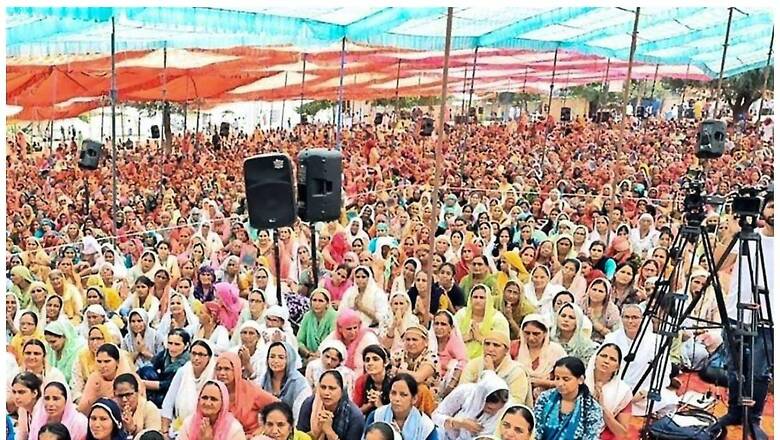
views
News reports and comments on the stampede in Hathras district have focused on the immediate causes responsible for the tragedy which resulted in the deaths of 123 people, mostly women and children. Sadly, no one has even mentioned the root cause: suppression of free speech in matters related to religion. The unsavory development began about a century ago; the process is on, as we shall see.
So, typically, the entire discussion, however extensive and intensive, is about nitty-gritty and minutiae. We are told that the Uttar Pradesh Police, in its first information report (FIR), said that around 250,000 people turned up for the religious event on July 2, whereas the permission was only 80,000. It was organised by Sri Jagar Guru Baba, founded by a cop-turned-‘Godman’, Suraj Pal, also known as Narayan Sakar Hari or Bhole Baba. The stampede was caused as the devotees rushed to gather ‘charan dhooli’ (the dust on which the Baba walked).
Local officials exhibited monumental ineptitude: the administration did not prepare itself with the minimal requirements like first aid and ambulances; standard operating procedures were not followed; intelligence inputs were not taken into account; and so on. Then there were typical allegations and counter-allegations as ruling and Opposition politicians attacked each other.
The unsavory past of the Baba was also talked about; and a lot of people expressed dismay at the superstition, of practices like gathering ‘charan dhooli.’
But, unfortunately, no one has raised the most important and pertinent question: what sustains superstition, mumbo jumbo, and abracadabra? This is because the political and intellectual elites in our country have drawn a redline for themselves, a Lakshman rekha: never enter the religious zone.
Almost a century ago, Section 295A of the Indian Penal Code drew this redline, shielding religion from criticism and severely curtailing freedom of expression.
The origin of Section 295A has links to the Rangila Rasul controversy in the 1920s. Rangila Rasul was a book about Prophet Mohammed which Muslims found offensive. Since the extant laws at that time were not intended to criminalise blasphemous content, Section 295A was crafted. Thus, the Section, introduced in 1927, became the anti-blasphemy law.
The Imperial Legislative Council passed Section 295A, which said, “Whoever, with deliberate and malicious intention of outraging the religious feelings of any class of His Majesty’s subjects, by words, either spoken or written, or by visible representations, insults or attempts to insult the religion or the religious beliefs of that class, shall be punished with imprisonment of either description for a term which may extend to two years, or with fine, or with both.” (In the Bharatiya Nyaya Sanhita, it is Section 299).
In essence, the law remains so—not just in India but also in Pakistan and Bangladesh.
It will be interesting to note that the council members expressed concerns over the abuse of the Section; they were also aware of, to use contemporary phraseology, its chilling effect on free speech. Sir James Crerar, government representative in the council, said, “To… restrain scurrilous and aggressive intolerance is one thing, but we must beware of imposing unnecessary and dangerous impediments on the free movement of thought and speech in legitimate enquiry and discussion.”
Sir Hari Singh Gour sought protection for those who “in the discharge of a public duty to state a historical fact or to publish the result of research” may unintentionally arouse “hostile feelings.” Jinnah also expressed a similar opinion, saying that “historical works… and honest criticisms of religion” should be protected.
Evidently, the hope of 295A supporters—that it would only target scurrilous writings without suppressing freedom of expression—has been belied. Even Mahatma Gandhi’s hope—that some erosion of free speech can improve communal harmony—was belied. Paraphrasing Benjamin Franklin, we can say that those who would give up essential liberty to purchase a little temporary peace, deserve neither liberty nor peace. Section 295A eroded liberty but did nothing to improve Hindu-Muslim relations, which worsened after 1927, resulting in bloody riots and Partition.
Worse, Section 295A also proved to be the death knell of socio-religious reforms that were carried out for almost a century before that. For these reforms were predicated upon criticism of religious practices and beliefs which had a deleterious effect on society and culture. For instance, Raja Ram Mohan Roy (1772-1833), father Indian Renaissance, wrote that “the promoters of the worship of images, by promulgating anecdotes illustrative of the supposed divine power of particular idols, endeavour to excite the reverence of the people, and specially of pilgrims, who, under these superstitious ideas, are persuaded to propitiate them with large sacrifices of money, and sometimes even by that of their own lives.”
Similarly, Swami Dayananda Saraswati (1824-83), the founder of Arya Samaj, castigated superstitions and endless rituals in Hindu society; he has been widely praised by important people, including Prime Minister Narendra Modi. In his magnum opus, Satyartha Prakash, Dayananda wrote that “idolatry is adharma.”
By keeping religion outside the purview of reason and criticism, Section 295A extinguished the reforms that such great men had carried out for a century. Now, only homilies and platitudes can be uttered. Minds have been shackled and mouths silenced. The result? Proliferation of ostentatious religiosity, rituals, pilgrimages, abracadabra, superstitions—and of Babas.
The author is a freelance journalist. Views expressed in the above piece are personal and solely those of the author. They do not necessarily reflect News18’s views.




















Comments
0 comment